https://education.ufl.edu/news/files/2019/07/News-1-300x65.png
0
0
https://education.ufl.edu/news/files/2019/07/News-1-300x65.png
2010-07-21 15:22:452011-10-13 12:19:50Education College Council voted No. 1 on campus
https://education.ufl.edu/news/files/2019/07/News-1-300x65.png
0
0
https://education.ufl.edu/news/files/2019/07/News-1-300x65.png
2010-07-21 15:14:582016-05-06 14:18:50Student FEA chapter, president earn top national honors
https://education.ufl.edu/news/files/2019/07/News-1-300x65.png
0
0
https://education.ufl.edu/news/files/2019/07/News-1-300x65.png
2010-07-21 15:10:492011-10-13 12:19:503 COE scholars cited for excellence in research reporting
https://education.ufl.edu/news/files/2019/07/News-1-300x65.png
0
0
https://education.ufl.edu/news/files/2019/07/News-1-300x65.png
2010-07-21 14:47:472011-10-13 12:19:50UF professor receives alumni award for higher-ed teaching
https://education.ufl.edu/news/files/2019/07/News-1-300x65.png
0
0
https://education.ufl.edu/news/files/2019/07/News-1-300x65.png
2010-06-10 15:13:332011-10-13 12:19:50Luis Ponjuan: raising a voice against the ‘silent crisis' in education
https://education.ufl.edu/news/files/2019/07/News-1-300x65.png
0
0
https://education.ufl.edu/news/files/2019/07/News-1-300x65.png
2010-05-25 11:21:132011-10-13 12:19:51'Outstanding Young Alum' showed early promise as teacher
https://education.ufl.edu/news/files/2019/07/News-1-300x65.png
0
0
https://education.ufl.edu/news/files/2019/07/News-1-300x65.png
2010-05-18 11:21:192011-10-13 12:19:51Business office assistant Mike Carter wins Superior Achievement Award
https://education.ufl.edu/news/files/2019/07/News-1-300x65.png
0
0
https://education.ufl.edu/news/files/2019/07/News-1-300x65.png
2010-05-17 13:31:052011-10-13 12:19:51College students more likely to report campus threats if 'connected' to school—UF study
https://education.ufl.edu/news/files/2019/07/News-1-300x65.png
0
0
https://education.ufl.edu/news/files/2019/07/News-1-300x65.png
2010-05-14 11:11:552011-10-13 12:19:51College of Education 2010 Commencement Awards
https://education.ufl.edu/news/files/2019/07/News-1-300x65.png
0
0
https://education.ufl.edu/news/files/2019/07/News-1-300x65.png
2010-05-13 17:29:582011-10-13 12:19:51Education sec’y enlists UF professor to advise on NCLB overhaul
https://education.ufl.edu/news/files/2019/07/News-1-300x65.png
0
0
https://education.ufl.edu/news/files/2019/07/News-1-300x65.png
2010-05-13 17:21:432011-10-13 12:19:51College earns re-accreditation, with praise for high quality of faculty, students
https://education.ufl.edu/news/files/2019/07/News-1-300x65.png
0
0
https://education.ufl.edu/news/files/2019/07/News-1-300x65.png
2010-05-13 16:50:562011-10-13 12:19:51COE fetes 'engaged scholarship' efforts done for public good
https://education.ufl.edu/news/files/2019/07/News-1-300x65.png
0
0
https://education.ufl.edu/news/files/2019/07/News-1-300x65.png
2010-05-13 16:32:212011-10-13 12:19:51Qualitative researcher earns UFRF Professorship
https://education.ufl.edu/news/files/2019/07/News-1-300x65.png
0
0
https://education.ufl.edu/news/files/2019/07/News-1-300x65.png
2010-05-13 10:14:552011-10-13 12:19:51coE-News: May 19, 2010, Vol. 5, Issue 6
https://education.ufl.edu/news/files/2019/07/News-1-300x65.png
0
0
https://education.ufl.edu/news/files/2019/07/News-1-300x65.png
2010-04-30 12:42:062011-10-13 12:19:51UF scholars out in force at national education research meeting
https://education.ufl.edu/news/files/2019/07/News-1-300x65.png
0
0
https://education.ufl.edu/news/files/2019/07/News-1-300x65.png
2010-04-13 13:12:182011-10-13 12:19:52Cavanaugh named Fulbright Scholar for online learning project in Nepal
https://education.ufl.edu/news/files/2019/07/News-1-300x65.png
0
0
https://education.ufl.edu/news/files/2019/07/News-1-300x65.png
2010-04-13 12:25:072011-10-13 12:19:52College business, alumni, events are in good hands with 2010 Staff Members of Year
https://education.ufl.edu/news/files/2019/07/News-1-300x65.png
0
0
https://education.ufl.edu/news/files/2019/07/News-1-300x65.png
2010-04-13 12:12:562011-10-13 12:19:52UF professors work to influence how NCLB overhaul affects special education teacher quality, assessment
https://education.ufl.edu/news/files/2019/07/News-1-300x65.png
0
0
https://education.ufl.edu/news/files/2019/07/News-1-300x65.png
2010-04-13 11:18:212011-10-13 12:19:52‘Virtual’ internships prepare student teachers for new world of online schooling
https://education.ufl.edu/news/files/2019/07/News-1-300x65.png
0
0
https://education.ufl.edu/news/files/2019/07/News-1-300x65.png
2010-04-13 11:08:162011-10-13 12:19:52DEAN'S MESSAGE: Education bill on Gov. Crist’s desk ignores true reform
https://education.ufl.edu/news/files/2019/07/News-1-300x65.png
0
0
https://education.ufl.edu/news/files/2019/07/News-1-300x65.png
2010-04-08 15:39:182016-05-06 14:18:22Special ed professor lands CEC honor for excellence in teacher education
https://education.ufl.edu/news/files/2019/07/News-1-300x65.png
0
0
https://education.ufl.edu/news/files/2019/07/News-1-300x65.png
2010-04-05 11:10:422016-05-09 15:46:27coE-News: April 19, 2010, Vol. 5, Issue 5
https://education.ufl.edu/news/files/2019/07/News-1-300x65.png
0
0
https://education.ufl.edu/news/files/2019/07/News-1-300x65.png
2010-03-19 17:14:502011-10-13 12:19:52To predict student success, there’s no place like home: UF study
https://education.ufl.edu/news/files/2019/07/News-1-300x65.png
0
0
https://education.ufl.edu/news/files/2019/07/News-1-300x65.png
2010-03-04 11:07:342011-10-13 12:19:52Dean to address Baby Gator conference March 20 for parents of young children
https://education.ufl.edu/news/files/2019/07/News-1-300x65.png
0
0
https://education.ufl.edu/news/files/2019/07/News-1-300x65.png
2010-03-02 17:41:362016-05-10 13:58:27Special education professor receives TED/Merrill Award
https://education.ufl.edu/news/files/2019/07/News-1-300x65.png
0
0
https://education.ufl.edu/news/files/2019/07/News-1-300x65.png
2010-03-01 11:13:492011-10-13 12:19:5231 UF minority scholarship students attend FFMT annual conference
https://education.ufl.edu/news/files/2019/07/News-1-300x65.png
0
0
https://education.ufl.edu/news/files/2019/07/News-1-300x65.png
2010-02-12 10:12:492011-10-13 12:19:52Alumni to offer career guidance at Education Career Night Feb. 18—on teaching and much more
https://education.ufl.edu/news/files/2019/07/News-1-300x65.png
0
0
https://education.ufl.edu/news/files/2019/07/News-1-300x65.png
2010-02-12 09:16:062011-10-13 12:19:53DEAN'S MESSAGE: Improved accountability could elevate teaching profession to deserved status
https://education.ufl.edu/news/files/2019/07/News-1-300x65.png
0
0
https://education.ufl.edu/news/files/2019/07/News-1-300x65.png
2010-02-07 16:07:572011-10-13 12:19:532010 Engaged Scholarship Awards
https://education.ufl.edu/news/files/2019/07/News-1-300x65.png
0
0
https://education.ufl.edu/news/files/2019/07/News-1-300x65.png
2010-02-05 09:09:272011-10-13 12:19:53coE-News: December, 2009, Vol. 5, No. 3
https://education.ufl.edu/news/files/2019/07/News-1-300x65.png
0
0
https://education.ufl.edu/news/files/2019/07/News-1-300x65.png
2010-02-04 11:22:392011-10-13 12:19:53Dean named to blue-ribbon panel on teacher preparation reform
https://education.ufl.edu/news/files/2019/07/News-1-300x65.png
0
0
https://education.ufl.edu/news/files/2019/07/News-1-300x65.png
2010-02-03 16:49:342011-10-13 12:19:53Student-teacher is Hall of Famer, but she’s ‘Atom Queen’ to her 5th-graders
https://education.ufl.edu/news/files/2019/07/News-1-300x65.png
0
0
https://education.ufl.edu/news/files/2019/07/News-1-300x65.png
2010-02-03 16:07:452011-10-13 12:19:53Virtual schooling: Rethinking classroom boundaries
https://education.ufl.edu/news/files/2019/07/News-1-300x65.png
0
0
https://education.ufl.edu/news/files/2019/07/News-1-300x65.png
2010-02-02 16:31:232011-10-13 12:19:53UF tackles dire shortage of teachers—and professors—in special education
https://education.ufl.edu/news/files/2019/07/News-1-300x65.png
0
0
https://education.ufl.edu/news/files/2019/07/News-1-300x65.png
2010-02-01 12:49:182011-10-13 12:19:53Accreditation team sets forums Feb. 8-9 with COE students, faculty
https://education.ufl.edu/news/files/2019/07/News-1-300x65.png
0
0
https://education.ufl.edu/news/files/2019/07/News-1-300x65.png
2010-01-26 16:53:242011-10-13 12:19:53Hodge appointed senior director of development-alumni affairs
https://education.ufl.edu/news/files/2019/07/News-1-300x65.png
0
0
https://education.ufl.edu/news/files/2019/07/News-1-300x65.png
2010-01-26 15:54:422011-10-13 12:19:53Professor speaks at D.C. briefing on educational crisis facing young men of color
https://education.ufl.edu/news/files/2019/07/News-1-300x65.png
0
0
https://education.ufl.edu/news/files/2019/07/News-1-300x65.png
2010-01-20 15:36:562011-10-13 12:19:53Community counseling needed for U.S. relatives of Haiti earthquake victims, UF professor says
https://education.ufl.edu/news/files/2019/07/News-1-300x65.png
0
0
https://education.ufl.edu/news/files/2019/07/News-1-300x65.png
2010-01-13 17:04:352016-05-06 14:17:50Faculty Diversity Workshop
https://education.ufl.edu/news/files/2019/07/News-1-300x65.png
0
0
https://education.ufl.edu/news/files/2019/07/News-1-300x65.png
2009-12-17 13:29:022016-10-28 14:08:50Internationalizing the College of Education
https://education.ufl.edu/news/files/2019/07/News-1-300x65.png
0
0
https://education.ufl.edu/news/files/2019/07/News-1-300x65.png
2009-12-11 09:54:552011-10-13 12:19:54With $1.6 million grant, UF partnering with Pinellas schools to develop master teachers in science and math
https://education.ufl.edu/news/files/2019/07/News-1-300x65.png
0
0
https://education.ufl.edu/news/files/2019/07/News-1-300x65.png
2009-12-10 17:03:012011-10-13 12:19:54Anita Zucker (BAE ’72) receives Distinguished Alumni Award
https://education.ufl.edu/news/files/2019/07/News-1-300x65.png
0
0
https://education.ufl.edu/news/files/2019/07/News-1-300x65.png
2009-12-10 16:09:262011-10-13 12:19:54STL shines at History Education Society meeting
https://education.ufl.edu/news/files/2019/07/News-1-300x65.png
0
0
https://education.ufl.edu/news/files/2019/07/News-1-300x65.png
2009-12-09 08:47:572011-10-13 12:19:54World-class scholar Don Deshler is next ‘Distinguished Speaker’ Feb. 4
https://education.ufl.edu/news/files/2019/07/News-1-300x65.png
0
0
https://education.ufl.edu/news/files/2019/07/News-1-300x65.png
2009-12-08 12:00:252011-10-13 12:19:54Int'l Ed Week spurs ideas for college ‘globalization'
https://education.ufl.edu/news/files/2019/07/News-1-300x65.png
0
0
https://education.ufl.edu/news/files/2019/07/News-1-300x65.png
2009-12-03 16:51:112011-10-13 12:19:54Counselor Ed scholars named International Educators of Year
https://education.ufl.edu/news/files/2019/07/News-1-300x65.png
0
0
https://education.ufl.edu/news/files/2019/07/News-1-300x65.png
2009-12-03 16:30:222011-10-13 12:19:54Ed tech researcher cited for innovations in online learning
https://education.ufl.edu/news/files/2019/07/News-1-300x65.png
0
0
https://education.ufl.edu/news/files/2019/07/News-1-300x65.png
2009-12-03 16:07:112016-05-06 14:10:28coE-News: February 2010, Vol. 5, Issue 4
https://education.ufl.edu/news/files/2019/07/News-1-300x65.png
0
0
https://education.ufl.edu/news/files/2019/07/News-1-300x65.png
2009-11-30 15:09:472011-10-13 12:19:54Meet our new faculty for 2009-10
https://education.ufl.edu/news/files/2019/07/News-1-300x65.png
0
0
https://education.ufl.edu/news/files/2019/07/News-1-300x65.png
2009-11-30 10:48:582011-10-13 12:19:55COE fetes top efforts in 'engaged scholarship'--novel research done for public good
Scroll to top
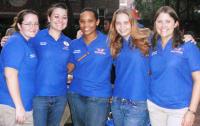

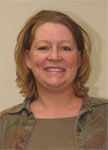
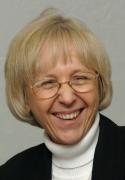
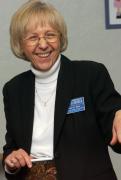
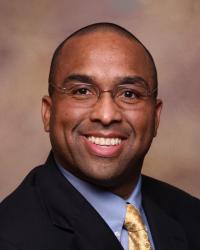 Fast-forward to 2010, nearly 40 years after immigrating to the U.S. Earlier this year, Ponjuan was addressing a national briefing at the U.S. Capitol to raise awareness of the overwhelming barriers that minority male students—particularly Latino boys—face in America's educational system. He could have spoken from personal experience, but he's also a fast-rising scholar on diversity issues of gender and ethnicity in higher education.
Fast-forward to 2010, nearly 40 years after immigrating to the U.S. Earlier this year, Ponjuan was addressing a national briefing at the U.S. Capitol to raise awareness of the overwhelming barriers that minority male students—particularly Latino boys—face in America's educational system. He could have spoken from personal experience, but he's also a fast-rising scholar on diversity issues of gender and ethnicity in higher education.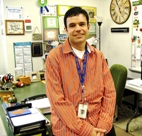 “I have always wanted to be a teacher. From the first day of kindergarten, I grabbed a chalkboard and taught my mom what I learned in school that day,” said Berry, 34, who teaches gifted third- through fifth-graders at Alachua Elementary. “It continued as I grew older, from ‘playing school’ with my cousins and friends to volunteering and becoming involved with Future Educators of America in middle and high school.
“I have always wanted to be a teacher. From the first day of kindergarten, I grabbed a chalkboard and taught my mom what I learned in school that day,” said Berry, 34, who teaches gifted third- through fifth-graders at Alachua Elementary. “It continued as I grew older, from ‘playing school’ with my cousins and friends to volunteering and becoming involved with Future Educators of America in middle and high school. 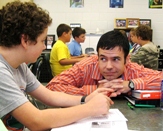 Berry (pictured, right, chatting with 5th grader Paul Winner) was one of the school’s first National Board Certified teachers and developed a mentoring program to help other Alachua Elementary teachers earn this prestigious designation. He also was instrumental in Alachua Elementary becoming a founding partner in a pilot “professional development community” (or PDC), a network of 10 Alachua County elementary schools. At PDC schools, UF education students learn to teach diverse learners alongside school-based mentors and UF professors who are committed to inclusive education in public schools.
Berry (pictured, right, chatting with 5th grader Paul Winner) was one of the school’s first National Board Certified teachers and developed a mentoring program to help other Alachua Elementary teachers earn this prestigious designation. He also was instrumental in Alachua Elementary becoming a founding partner in a pilot “professional development community” (or PDC), a network of 10 Alachua County elementary schools. At PDC schools, UF education students learn to teach diverse learners alongside school-based mentors and UF professors who are committed to inclusive education in public schools.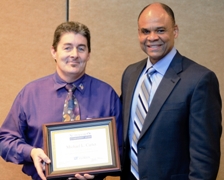 Carter’s “can-do” attitude and attention to detail, plus his cool-as-a-cucumber demeanor under stress, explains why he was nominated and chosen recently for a universitywide 2010 Superior Accomplishment Award in the clerical/office support category. (Pictured right, Carter receives his award from UF Associate Provost Bernard Mair.)
Carter’s “can-do” attitude and attention to detail, plus his cool-as-a-cucumber demeanor under stress, explains why he was nominated and chosen recently for a universitywide 2010 Superior Accomplishment Award in the clerical/office support category. (Pictured right, Carter receives his award from UF Associate Provost Bernard Mair.)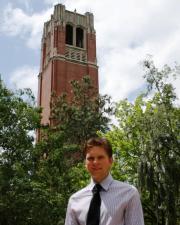 The dissertation study by Michael Sulkowski, a doctoral student in school psychology at UF’s College of Education, queried 820 UF undergraduates.
The dissertation study by Michael Sulkowski, a doctoral student in school psychology at UF’s College of Education, queried 820 UF undergraduates.
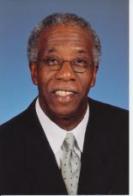 When Max Parker finished his doctorate at UF in the mid-1970s, he wasn’t ready to bid farewell to Norman Hall. Instead, he dedicated the next 26 years to an exemplary career on UF’s counselor education faculty, establishing himself as a campuswide leader and pioneer in multicultural counseling and development. He contributed to numerous college and university committees and advisory boards, and was a part-time counselor at the UF Counseling Center. Parker’s influence, though, extended beyond campus boundaries. He disseminated his research findings in numerous books and journals and received the Most Prolific Contributor Award for his work with the Journal of Multicultural Counseling. He collaborated with several Florida school districts and consulted with numerous colleges and universities. He also conducted group discussions and research in West Africa and Puerto Rico. His experience as an educator spans four decades, and in 1996 he received two universitywide awards for excellence in teaching and research. Although Parker retired from academia in 2003, he still lives in Gainesville and currently works as a mental health counselor in UF’s Student Health Care Center.
When Max Parker finished his doctorate at UF in the mid-1970s, he wasn’t ready to bid farewell to Norman Hall. Instead, he dedicated the next 26 years to an exemplary career on UF’s counselor education faculty, establishing himself as a campuswide leader and pioneer in multicultural counseling and development. He contributed to numerous college and university committees and advisory boards, and was a part-time counselor at the UF Counseling Center. Parker’s influence, though, extended beyond campus boundaries. He disseminated his research findings in numerous books and journals and received the Most Prolific Contributor Award for his work with the Journal of Multicultural Counseling. He collaborated with several Florida school districts and consulted with numerous colleges and universities. He also conducted group discussions and research in West Africa and Puerto Rico. His experience as an educator spans four decades, and in 1996 he received two universitywide awards for excellence in teaching and research. Although Parker retired from academia in 2003, he still lives in Gainesville and currently works as a mental health counselor in UF’s Student Health Care Center.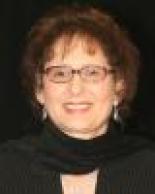 Linda Behar-Horenstein
Linda Behar-Horenstein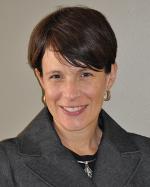 Jennifer Drake Patrick is a busy mother of three with a husband on military deployment overseas, but she doesn’t waste any of her free time. Last December, she took a break from her household duties to defend her revolutionary dissertation on subject-area literacy. Her research on the unique language of science contributes groundbreaking information to a rarely studied topic in literacy. Patrick’s dissertation details how effective teachers interpret and apply reading strategies geared specifically for science in their classrooms. Her research is based upon the premise that each subject area has its own unique dialogue, requiring teachers to adjust their teaching methods based on the subject they instruct. She explores how personal characteristics of a teacher, such as the depth of their understanding of the material, can impact their ability to teach a subject’s complex language. Her dissertation earned her a fiercely competitive fellowship from the National Academy of Education. Patrick has presented at several professional conferences and co-authored numerous publications while maintaining a perfect 4.0 GPA at UF.
Jennifer Drake Patrick is a busy mother of three with a husband on military deployment overseas, but she doesn’t waste any of her free time. Last December, she took a break from her household duties to defend her revolutionary dissertation on subject-area literacy. Her research on the unique language of science contributes groundbreaking information to a rarely studied topic in literacy. Patrick’s dissertation details how effective teachers interpret and apply reading strategies geared specifically for science in their classrooms. Her research is based upon the premise that each subject area has its own unique dialogue, requiring teachers to adjust their teaching methods based on the subject they instruct. She explores how personal characteristics of a teacher, such as the depth of their understanding of the material, can impact their ability to teach a subject’s complex language. Her dissertation earned her a fiercely competitive fellowship from the National Academy of Education. Patrick has presented at several professional conferences and co-authored numerous publications while maintaining a perfect 4.0 GPA at UF.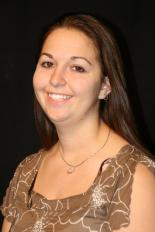 Kali Davis knows how to ignite support for a cause. While a student at UF, she established Coalition Save our Schools, drawing more than 200 students to support the College of Education last year after severe state budget cuts threatened college programs. She invited school, district and state officials and educators to speak at an evening candlelight vigil to protest the cuts. She has organized several other coalition rallies throughout the state in support of higher education, invigorating college and education advocates. Davis, who graduated from the ProTeach program in December 2009 with a 3.89 GPA, demonstrated the leadership skills that are imperative to good teaching. As the 2009 president of the Student Florida Education Association, she coordinated with student chapters across the state and coordinated a state conference in Jacksonville. She also presented at the FEA national conference in San Diego. Davis focused on special education in her studies, preparing to teach students with unique emotional and behavioral needs.
Kali Davis knows how to ignite support for a cause. While a student at UF, she established Coalition Save our Schools, drawing more than 200 students to support the College of Education last year after severe state budget cuts threatened college programs. She invited school, district and state officials and educators to speak at an evening candlelight vigil to protest the cuts. She has organized several other coalition rallies throughout the state in support of higher education, invigorating college and education advocates. Davis, who graduated from the ProTeach program in December 2009 with a 3.89 GPA, demonstrated the leadership skills that are imperative to good teaching. As the 2009 president of the Student Florida Education Association, she coordinated with student chapters across the state and coordinated a state conference in Jacksonville. She also presented at the FEA national conference in San Diego. Davis focused on special education in her studies, preparing to teach students with unique emotional and behavioral needs.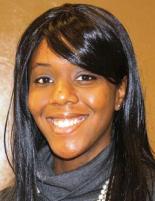 Alexandria Harvey received her master’s degree in May from the Unified Elementary ProTeach program with a specialization in special education and a 3.66 graduate level GPA. She excelled not only in her coursework, but also in her performance as a teacher-in-training. She engaged in professional development activities well beyond her course requirements. Harvey took extra graduate level courses to prepare for teaching the most vulnerable students—those with pervasive special needs and disabilities. Her supervising teachers say she distinguished herself in her internship and practicum placements, demonstrating an ability to carefully plan lessons appropriate for students with special emotional and behavioral impairments. She also proved capable in reflective self-assessment, identifying not only her most effective teaching practices but also the areas to address to improve her instruction. When putting her lesson plans into action, she always found a way to engage students in learning and bolster their participation. She tried to involve parents in their children’s education, maintaining close communication with them. One of her internship supervisors stated that in over 40 years of supervising interns, Harvey would rank in the top 1 percent.
Alexandria Harvey received her master’s degree in May from the Unified Elementary ProTeach program with a specialization in special education and a 3.66 graduate level GPA. She excelled not only in her coursework, but also in her performance as a teacher-in-training. She engaged in professional development activities well beyond her course requirements. Harvey took extra graduate level courses to prepare for teaching the most vulnerable students—those with pervasive special needs and disabilities. Her supervising teachers say she distinguished herself in her internship and practicum placements, demonstrating an ability to carefully plan lessons appropriate for students with special emotional and behavioral impairments. She also proved capable in reflective self-assessment, identifying not only her most effective teaching practices but also the areas to address to improve her instruction. When putting her lesson plans into action, she always found a way to engage students in learning and bolster their participation. She tried to involve parents in their children’s education, maintaining close communication with them. One of her internship supervisors stated that in over 40 years of supervising interns, Harvey would rank in the top 1 percent. “Secretary Duncan was seeking specific examples and input on the language to use in the proposed reauthorization of the Elementary and Secondary Education Act (the formal name of No Child Left Behind),” Cavanaugh said. “I shared the data work we’ve done through UF’s Virtual School Clearinghouse and shared the findings of the 2009 report I wrote for the Center for American Progress about how virtual schooling can save money and expand learning time during the school day.”
“Secretary Duncan was seeking specific examples and input on the language to use in the proposed reauthorization of the Elementary and Secondary Education Act (the formal name of No Child Left Behind),” Cavanaugh said. “I shared the data work we’ve done through UF’s Virtual School Clearinghouse and shared the findings of the 2009 report I wrote for the Center for American Progress about how virtual schooling can save money and expand learning time during the school day.”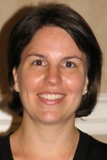 UF's extensive accreditation preparation was headed by Tom Dana, associate dean of academic affairs; Theresa Vernetson, assistant dean of student affairs, and Elayne Colón (pictured right), director of assessment and accreditation.
UF's extensive accreditation preparation was headed by Tom Dana, associate dean of academic affairs; Theresa Vernetson, assistant dean of student affairs, and Elayne Colón (pictured right), director of assessment and accreditation.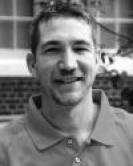 Engaged scholarship comes naturally to Jacobbe, who blends his teaching and research in mathematics education with service to high-need elementary schools in his community. He teaches a math methods class to the elementary students and also provides supervised teaching opportunities for his UF preservice students. His activities not only support our future elementary math teachers but also benefit hundreds of schoolchildren from low-income families who are often marginalized in today’s education system. Jacobbe and his UF students also stage Family Math Night events two or three times each year at the schools, bringing together the schoolchildren and their families for fun math games and learning. These activities also model engaged-scholarship-in-action for UF doctoral students in math education. Jacobbe studies the impact of these efforts on preservice teacher and elementary student learning and disseminates his findings so other educators might benefit.
Engaged scholarship comes naturally to Jacobbe, who blends his teaching and research in mathematics education with service to high-need elementary schools in his community. He teaches a math methods class to the elementary students and also provides supervised teaching opportunities for his UF preservice students. His activities not only support our future elementary math teachers but also benefit hundreds of schoolchildren from low-income families who are often marginalized in today’s education system. Jacobbe and his UF students also stage Family Math Night events two or three times each year at the schools, bringing together the schoolchildren and their families for fun math games and learning. These activities also model engaged-scholarship-in-action for UF doctoral students in math education. Jacobbe studies the impact of these efforts on preservice teacher and elementary student learning and disseminates his findings so other educators might benefit.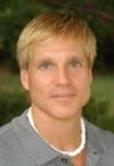 Gagnon’s research and advocacy pursuits have focused intently on “the public good” for nearly three decades. He interrupted his teaching career early on in the 1980s to become a Peace Corps volunteer for two years in Morocco, where he taught schoolchildren with various disabilities. He returned to Sebring, Fla., as a special educator, determined to improve the education and plight of students with emotional and behavioral disabilities. He received his doctorate in behavioral disorders in 2002 from the University of Maryland, where he became affiliated with the National Center on Education, Disability and Juvenile Justice. His research on curriculum, assessment and accountability policies in exclusionary school settings has earned him national acclaim. He has published extensively on policy issues and academic improvement for students in confinement, and he has served as an expert consultant and court monitor for the civil rights division of the U.S. Department of Justice.
Gagnon’s research and advocacy pursuits have focused intently on “the public good” for nearly three decades. He interrupted his teaching career early on in the 1980s to become a Peace Corps volunteer for two years in Morocco, where he taught schoolchildren with various disabilities. He returned to Sebring, Fla., as a special educator, determined to improve the education and plight of students with emotional and behavioral disabilities. He received his doctorate in behavioral disorders in 2002 from the University of Maryland, where he became affiliated with the National Center on Education, Disability and Juvenile Justice. His research on curriculum, assessment and accountability policies in exclusionary school settings has earned him national acclaim. He has published extensively on policy issues and academic improvement for students in confinement, and he has served as an expert consultant and court monitor for the civil rights division of the U.S. Department of Justice.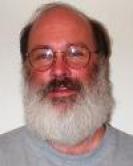 Miller heads the college’s CAPES (Collaborative Assessment and Program Evaluation Services) program, which provides vital assessment and research support for grant programs across UF and in partnering school districts. He has worked with the Jacksonville Children’s Commission since 2008 to provide an effective model for evaluating their many child and family services. He also is devising evaluation standards for the commission’s New Town Success Zone, serving mostly at–risk children. Last year, a report Miller wrote analyzing the state of Alabama’s Teacher Certification Testing program helped end nearly 30 years of litigation concerning the methods of Alabama’s teacher testing programs. He also has provided assessment or expert-witness services, mainly on educational issues, to numerous states, Florida school districts and area charitable organizations.
Miller heads the college’s CAPES (Collaborative Assessment and Program Evaluation Services) program, which provides vital assessment and research support for grant programs across UF and in partnering school districts. He has worked with the Jacksonville Children’s Commission since 2008 to provide an effective model for evaluating their many child and family services. He also is devising evaluation standards for the commission’s New Town Success Zone, serving mostly at–risk children. Last year, a report Miller wrote analyzing the state of Alabama’s Teacher Certification Testing program helped end nearly 30 years of litigation concerning the methods of Alabama’s teacher testing programs. He also has provided assessment or expert-witness services, mainly on educational issues, to numerous states, Florida school districts and area charitable organizations.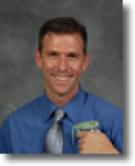 While some teachers are slow to embrace the latest classroom technology, Randy Hollinger worked tirelessly last summer to plan and pilot-test a new cyber-based approach to teaching his 7th grade science class. No textbooks were needed. Instead, Hollinger taught his students to integrate the latest Web tools into personal learning pages to research poisonous and venomous creatures. He helped his students improve their digital literacy skills and navigate the Internet effectively, and even advised them how to respectfully request assistance from university scientists all over the world. His students engaged in the scientific process and created digital artifacts using multi-media and digital posters. Hollinger noted measurable improvements in students’ writing, scientific reporting and research skills. His rapport with students extends beyond his classroom to a phenomenally popular musical performing arts class, and the PKY cross-country teams he coaches are perennial state title contenders.
While some teachers are slow to embrace the latest classroom technology, Randy Hollinger worked tirelessly last summer to plan and pilot-test a new cyber-based approach to teaching his 7th grade science class. No textbooks were needed. Instead, Hollinger taught his students to integrate the latest Web tools into personal learning pages to research poisonous and venomous creatures. He helped his students improve their digital literacy skills and navigate the Internet effectively, and even advised them how to respectfully request assistance from university scientists all over the world. His students engaged in the scientific process and created digital artifacts using multi-media and digital posters. Hollinger noted measurable improvements in students’ writing, scientific reporting and research skills. His rapport with students extends beyond his classroom to a phenomenally popular musical performing arts class, and the PKY cross-country teams he coaches are perennial state title contenders.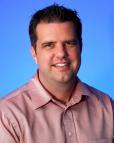 Barber, a Santa Fe College psychology instructor, has developed an impressive automated system for collecting data on his students’ engagement in learning and academic achievement. He has integrated this work into his doctoral studies aimed at identifying students’ personal traits and involvement in learning that will accurately predict their academic performance. His research provides a model for enhancing student engagement in higher education and has influenced the teaching methods of numerous UF instructors and teaching assistants with whom Barber shared his findings during his two years as a teaching assistant in educational psychology at UF. His self-assessment methods are proving particularly important in helping first-generation college students maintain their motivation and achievement. Barber has been involved in learning communities at the community college level which have been impacting students for many years.
Barber, a Santa Fe College psychology instructor, has developed an impressive automated system for collecting data on his students’ engagement in learning and academic achievement. He has integrated this work into his doctoral studies aimed at identifying students’ personal traits and involvement in learning that will accurately predict their academic performance. His research provides a model for enhancing student engagement in higher education and has influenced the teaching methods of numerous UF instructors and teaching assistants with whom Barber shared his findings during his two years as a teaching assistant in educational psychology at UF. His self-assessment methods are proving particularly important in helping first-generation college students maintain their motivation and achievement. Barber has been involved in learning communities at the community college level which have been impacting students for many years.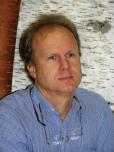 Putz, at UF since 1982, is an international expert on the ecological consequences of different land use practices. His research findings provide a sound ecological basis for forest conservation through sustainable use, balancing the protection of parks with the need to include livelihood-supporting approaches in forest management. In the 1980s, he executed the first forest certification audit for the organization that would become the Forest Stewardship Council. In the 1990s, he pioneered studies on the carbon benefits of “reduced-impact” logging. His research, and that of his students and collaborators, is influencing the development of worldwide policy on the best practices for forest management in the face of global climate change. He also is very involved in local environmental issues and efforts to increase environmental consciousness.
Putz, at UF since 1982, is an international expert on the ecological consequences of different land use practices. His research findings provide a sound ecological basis for forest conservation through sustainable use, balancing the protection of parks with the need to include livelihood-supporting approaches in forest management. In the 1980s, he executed the first forest certification audit for the organization that would become the Forest Stewardship Council. In the 1990s, he pioneered studies on the carbon benefits of “reduced-impact” logging. His research, and that of his students and collaborators, is influencing the development of worldwide policy on the best practices for forest management in the face of global climate change. He also is very involved in local environmental issues and efforts to increase environmental consciousness.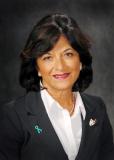 Janssen in 2008 became the first female superintendent of the Pinellas County School District, bolstering both the secondary and higher education programs in the county. She has worked extensively with UF’s Lastinger Center for Learning in recent efforts to “reinvent” professional development as a tool to improve teaching and learning and leadership in Pinellas County schools. Janssen has previously worked as a math teacher, high school principal and adjunct professor at the University of South Florida, where she earned her Ed.D. degree. She has held various leadership roles in Pinellas County schools and has consulted with school districts throughout the nation as a curriculum specialist. She balances her career with involvement in numerous civic causes and holds leadership posts with two local cancer-fighting foundations that she helped start.
Janssen in 2008 became the first female superintendent of the Pinellas County School District, bolstering both the secondary and higher education programs in the county. She has worked extensively with UF’s Lastinger Center for Learning in recent efforts to “reinvent” professional development as a tool to improve teaching and learning and leadership in Pinellas County schools. Janssen has previously worked as a math teacher, high school principal and adjunct professor at the University of South Florida, where she earned her Ed.D. degree. She has held various leadership roles in Pinellas County schools and has consulted with school districts throughout the nation as a curriculum specialist. She balances her career with involvement in numerous civic causes and holds leadership posts with two local cancer-fighting foundations that she helped start.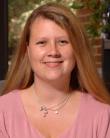 Koro-Ljungberg, an associate professor in research and evaluation methods, is one of 33 UF faculty researchers selected. UF’s research foundation awards the professorships to faculty who have made recent contributions in research and a have a strong research agenda likely to lead to continuing distinction in their fields. The three-year award includes a $5,000 annual salary supplement and a one-time $3,000 grant.
Koro-Ljungberg, an associate professor in research and evaluation methods, is one of 33 UF faculty researchers selected. UF’s research foundation awards the professorships to faculty who have made recent contributions in research and a have a strong research agenda likely to lead to continuing distinction in their fields. The three-year award includes a $5,000 annual salary supplement and a one-time $3,000 grant.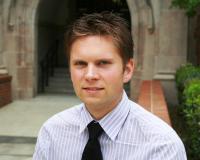

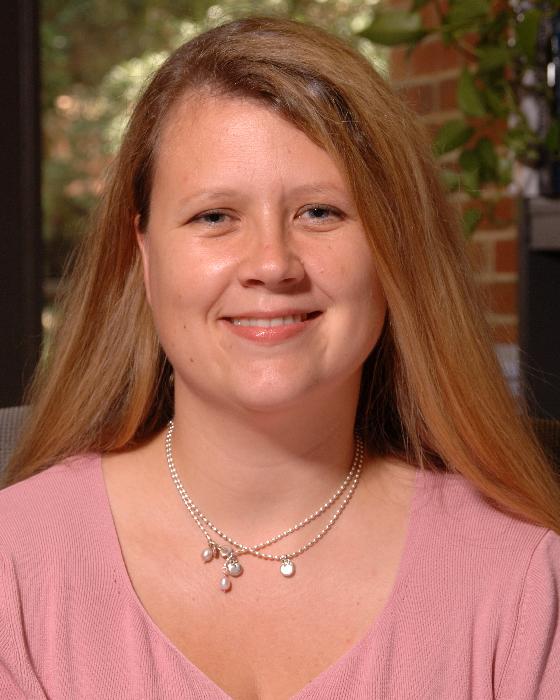 Koro-Ljungberg named to prestigious UFRF Professorship
Koro-Ljungberg named to prestigious UFRF Professorship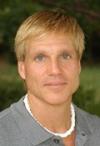

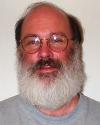
 Gagnon Jacobbe Miller Hollinger
Gagnon Jacobbe Miller Hollinger 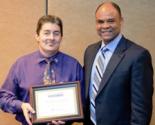
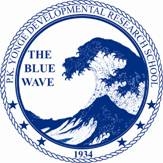



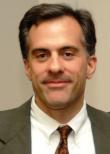 *May 16, 2010 — Sevan Terzian, social foundations of education
*May 16, 2010 — Sevan Terzian, social foundations of education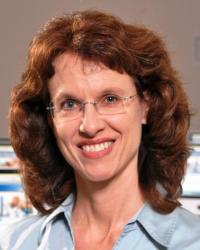 During her spring semester 2011 sabbatical, Cavanaugh will be based at Tribhuvan University in Kathmandu, the capital of Nepal located in the Himalayas of South Asia. She will train and work with faculty and graduate students there to increase access to education through improved classroom technology and online learning programs. Nepal in is one of the world’s newest democracies, with about half of its population living below the international poverty line.
During her spring semester 2011 sabbatical, Cavanaugh will be based at Tribhuvan University in Kathmandu, the capital of Nepal located in the Himalayas of South Asia. She will train and work with faculty and graduate students there to increase access to education through improved classroom technology and online learning programs. Nepal in is one of the world’s newest democracies, with about half of its population living below the international poverty line.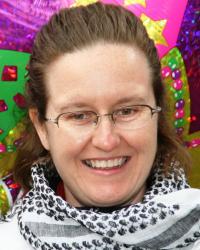 Sandy is an indispensable employee in the business office because she goes above and beyond her duties as Office Assistant. She has been a vital resource during the college’s recent faculty search in the early childhood studies program. She made sure announcements about the search were posted publicly and in a timely manner. She also has been quick to respond to questions or to seek clarification about search committee procedures and activities. Faculty and staff she interacts with voice appreciation for Sandy’s willingness to assist beyond normal expectations and to do so with a positive attitude. She is a talented, knowledgeable and devoted professional whose top priority is to make a direct and positive impact on every employee and student with whom she has contact. Her quiet strength is an inspiration and her energy and sense of humor make working with her a joy for co-workers.
Sandy is an indispensable employee in the business office because she goes above and beyond her duties as Office Assistant. She has been a vital resource during the college’s recent faculty search in the early childhood studies program. She made sure announcements about the search were posted publicly and in a timely manner. She also has been quick to respond to questions or to seek clarification about search committee procedures and activities. Faculty and staff she interacts with voice appreciation for Sandy’s willingness to assist beyond normal expectations and to do so with a positive attitude. She is a talented, knowledgeable and devoted professional whose top priority is to make a direct and positive impact on every employee and student with whom she has contact. Her quiet strength is an inspiration and her energy and sense of humor make working with her a joy for co-workers.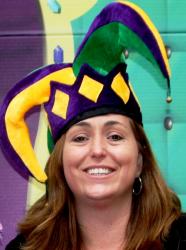 As the scheduler, planner and perpetual hostess of many special events staged within and by the College of Education, Jodi has one of the most constantly pressure-packed, detailed and deadline-oriented jobs in the college. Yet she pulls off these sophisticated events seemly without a hitch, and always maintains her cool, quick wit and sharp sense of humor. Occasionally, things do go wrong, but Jodi is so well-prepared that very few guests at her events are aware that the caterer was late, the microphone check failed, the laptop containing the dean’s PowerPoint slide show froze up and a server spilled the last vegetarian entrée before placement at the vegan’s dinner setting. The guests never know about all these behind-the-scene glitches because Jodi has a spur-of-the-moment resolution to virtually any problem that arises. She is everyone’s favorite party hostess, event planner, and involved co-worker at the College of Education.
As the scheduler, planner and perpetual hostess of many special events staged within and by the College of Education, Jodi has one of the most constantly pressure-packed, detailed and deadline-oriented jobs in the college. Yet she pulls off these sophisticated events seemly without a hitch, and always maintains her cool, quick wit and sharp sense of humor. Occasionally, things do go wrong, but Jodi is so well-prepared that very few guests at her events are aware that the caterer was late, the microphone check failed, the laptop containing the dean’s PowerPoint slide show froze up and a server spilled the last vegetarian entrée before placement at the vegan’s dinner setting. The guests never know about all these behind-the-scene glitches because Jodi has a spur-of-the-moment resolution to virtually any problem that arises. She is everyone’s favorite party hostess, event planner, and involved co-worker at the College of Education.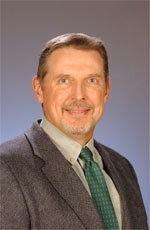 Professors Mary Brownell and Paul Sindelar helped draft a set of recommendations concerning special education teacher quality and evaluation in a report submitted in late March to the U.S. House education committee, which is considering President Obama’s recent proposal to overhaul the NLCB act. Brownell and Sindelar also conducted much of the research on which the recommendations were based.
Professors Mary Brownell and Paul Sindelar helped draft a set of recommendations concerning special education teacher quality and evaluation in a report submitted in late March to the U.S. House education committee, which is considering President Obama’s recent proposal to overhaul the NLCB act. Brownell and Sindelar also conducted much of the research on which the recommendations were based.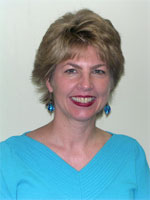 Brownell, co-holder of the Irving and Rose Fien Professorship in Education, helped write the special education recommendations while Sindelar served as a consultant on the effort. They currently co-direct the college’s National Center to Inform Policy and Practice in Special Education Professional Development, or NCIPP for short, and they previously oversaw UF’s Center on Personnel Studies in Special Education (COPPSE).
Brownell, co-holder of the Irving and Rose Fien Professorship in Education, helped write the special education recommendations while Sindelar served as a consultant on the effort. They currently co-direct the college’s National Center to Inform Policy and Practice in Special Education Professional Development, or NCIPP for short, and they previously oversaw UF’s Center on Personnel Studies in Special Education (COPPSE). 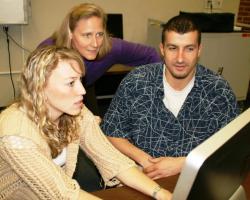 During his four-week internship, Giddo (pictured in UF's computer lab with student Kristen Brooks, left, with instructor Kara Dawson looking on) created a virtual tutorial on earthquakes, graded assignments, and improved his communication skills as he learned to give explicit, easy-to-understand instructions online. He hopes to use such technology in his own classroom once he graduates into the teaching profession in May. He hopes he can blend online learning with traditional face-to-face instruction in a “hybrid” classroom.
During his four-week internship, Giddo (pictured in UF's computer lab with student Kristen Brooks, left, with instructor Kara Dawson looking on) created a virtual tutorial on earthquakes, graded assignments, and improved his communication skills as he learned to give explicit, easy-to-understand instructions online. He hopes to use such technology in his own classroom once he graduates into the teaching profession in May. He hopes he can blend online learning with traditional face-to-face instruction in a “hybrid” classroom.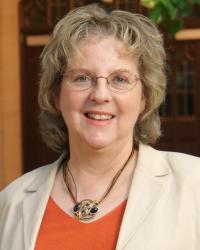 In this month’s column, I‘d like to review the key components that will most affect colleges of education, and conclude with a general comment on the heavy-handed approach to a very real and serious problem in this state – improving the academic performance of students, particularly those who attend the most challenged and diverse schools.
In this month’s column, I‘d like to review the key components that will most affect colleges of education, and conclude with a general comment on the heavy-handed approach to a very real and serious problem in this state – improving the academic performance of students, particularly those who attend the most challenged and diverse schools.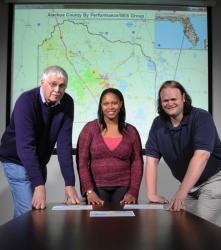 Headlines
Headlines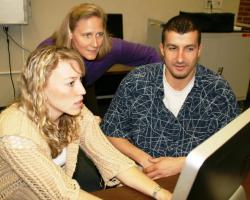
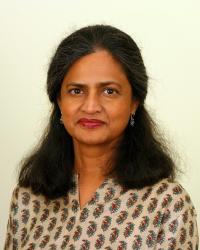 PRESENTATION TITLE: Improving Students’ Proportional Thinking Using
PRESENTATION TITLE: Improving Students’ Proportional Thinking Using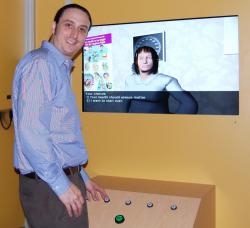 Health ed virtual simulator opens 10-year run at Tampa museum
Health ed virtual simulator opens 10-year run at Tampa museum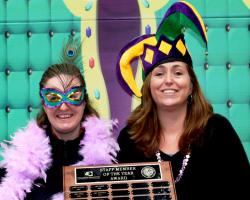 College business, events in good hands with 2010 Staff Members of Year
College business, events in good hands with 2010 Staff Members of Year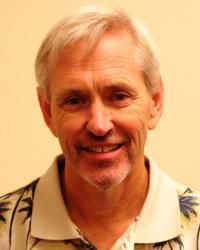 Special ed professor lands CEC honor for excellence in teacher education
Special ed professor lands CEC honor for excellence in teacher education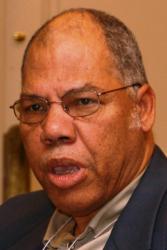
 Yendol-Hoppey, D., & Dana, N.F. (2010). Powerful Professional Development: Building Expertise Within the Four Walls of Your School. Thousand Oaks, CA. Corwin Press.
Yendol-Hoppey, D., & Dana, N.F. (2010). Powerful Professional Development: Building Expertise Within the Four Walls of Your School. Thousand Oaks, CA. Corwin Press.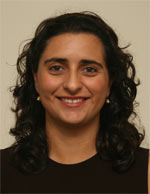 Mendoza, P. (2010). Does Student Debt Impact College Completion? A Causal Model. To be presented in May as a Fellow at the 2010 Houston Higher Education Finance Roundtable, sponsored by the University of Houston Law Center’s Institute of Higher Education Law and Governance, Houston, TX.
Mendoza, P. (2010). Does Student Debt Impact College Completion? A Causal Model. To be presented in May as a Fellow at the 2010 Houston Higher Education Finance Roundtable, sponsored by the University of Houston Law Center’s Institute of Higher Education Law and Governance, Houston, TX. Advance tickets for PKY’s spring production of the Tony-award winning murder-mystery musical comedy, Curtains, are now on sale. Get them now before prices go up. The PKY box office is open every Wednesday 3-6 p.m. Starting April 12 through May 2, box office hours extend from 12-6 p.m. weekdays. Reserved seating tickets may also be purchased online at
Advance tickets for PKY’s spring production of the Tony-award winning murder-mystery musical comedy, Curtains, are now on sale. Get them now before prices go up. The PKY box office is open every Wednesday 3-6 p.m. Starting April 12 through May 2, box office hours extend from 12-6 p.m. weekdays. Reserved seating tickets may also be purchased online at 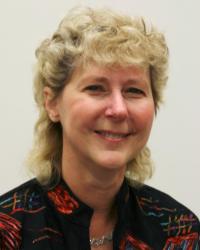 *Feb. 17, 2010 — Diane Ryndak, special education
*Feb. 17, 2010 — Diane Ryndak, special education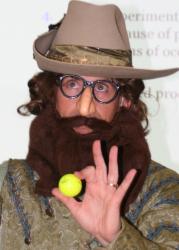 *March 8, 2010 – Griff Jones, UF Teach
*March 8, 2010 – Griff Jones, UF Teach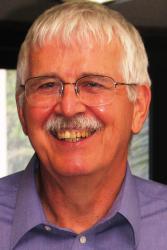 ASSOCIATED PRESS NEWSWIRE,
ASSOCIATED PRESS NEWSWIRE, 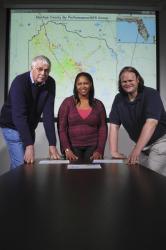
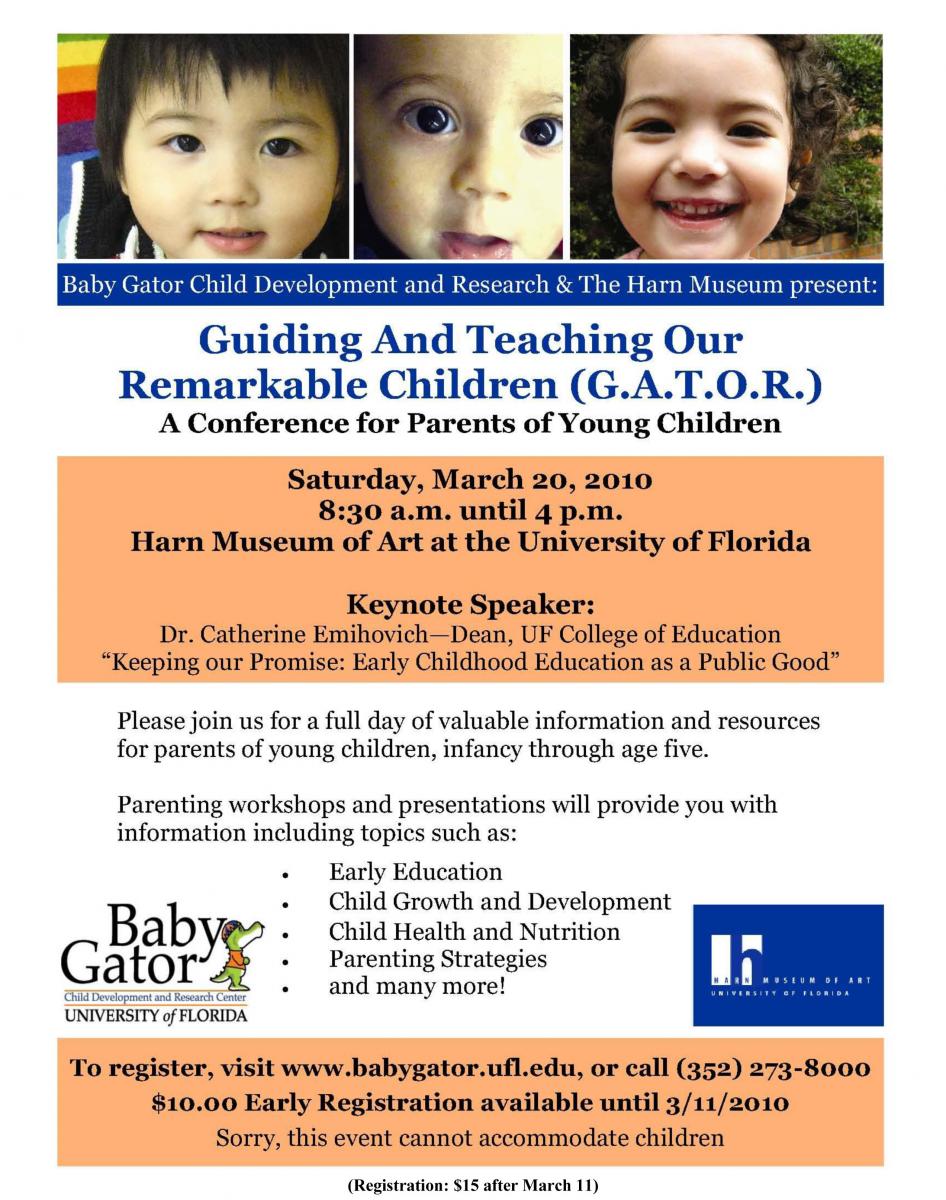
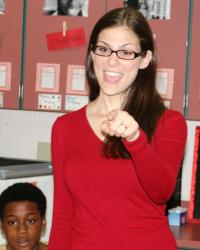 The young pupils don’t realize their teacher-in-training also wears another crown of sorts.
The young pupils don’t realize their teacher-in-training also wears another crown of sorts.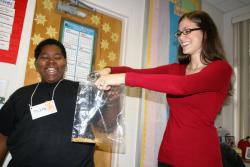 “I firmly believe in the ripple effect,” she says. “Even if you only reach one student at a time, they’ll go and do something that will reach a few other people, and those people will do something to reach a few more people. You really never know how far the ripple goes.”
“I firmly believe in the ripple effect,” she says. “Even if you only reach one student at a time, they’ll go and do something that will reach a few other people, and those people will do something to reach a few more people. You really never know how far the ripple goes.”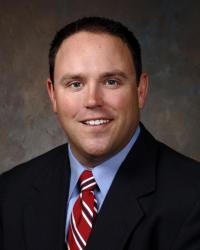 COE Dean Catherine Emihovich has announced the appointment of Matthew (Matt) Hodge to the new position of senior director of development and alumni affairs at the College of Education.
COE Dean Catherine Emihovich has announced the appointment of Matthew (Matt) Hodge to the new position of senior director of development and alumni affairs at the College of Education.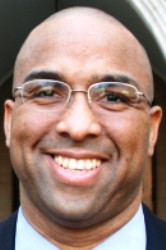 Luis Ponjuan, assistant professor in educational administration and policy at UF’s College of Education, was one of five national experts on minority education who participated in a panel discussion at the U.S. Capitol Visitor Center in Washington, D.C.
Luis Ponjuan, assistant professor in educational administration and policy at UF’s College of Education, was one of five national experts on minority education who participated in a panel discussion at the U.S. Capitol Visitor Center in Washington, D.C.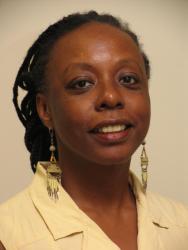 Since the magnitude 7.0 earthquake struck Jan. 12, Cirecie West-Olatunji, associate professor of counselor education at UF’s College of Education, has been involved in efforts of two national counseling organizations—the American Counseling Association and the Association for Multicultural Counseling and Development—to share information with fellow counselors about symptoms of traumatic stress and associated interventions.
Since the magnitude 7.0 earthquake struck Jan. 12, Cirecie West-Olatunji, associate professor of counselor education at UF’s College of Education, has been involved in efforts of two national counseling organizations—the American Counseling Association and the Association for Multicultural Counseling and Development—to share information with fellow counselors about symptoms of traumatic stress and associated interventions.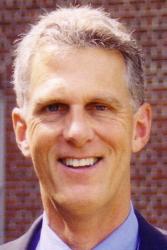 Lastinger Center founding director Don Pemberton (pictured, right) said the initiative could impact as many as 4,500 students in high-needs middle and high schools in Pinellas County. The training opportunities for their teachers include summer sessions and on-the-job training. Those in the degree program will take online classes and also study under UF education “professors-in-residence” who will visit them on site.
Lastinger Center founding director Don Pemberton (pictured, right) said the initiative could impact as many as 4,500 students in high-needs middle and high schools in Pinellas County. The training opportunities for their teachers include summer sessions and on-the-job training. Those in the degree program will take online classes and also study under UF education “professors-in-residence” who will visit them on site.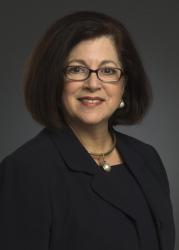 It’s difficult to pin a label on College of Education graduate Anita Zucker (BAE ’72), this year’s University of Florida Distinguished Alumni Award recipient. She is a former educator, a lifetime education advocate, a committed philanthropist, a history-making businesswoman, and one of Charleston, South Carolina’s leading citizens.
It’s difficult to pin a label on College of Education graduate Anita Zucker (BAE ’72), this year’s University of Florida Distinguished Alumni Award recipient. She is a former educator, a lifetime education advocate, a committed philanthropist, a history-making businesswoman, and one of Charleston, South Carolina’s leading citizens.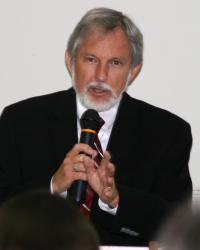 College of Education students need more exposure to diversity through activities like studying abroad, said a panel of four College of Education professors, joined by UF International Center Dean David Sammons (pictured, right). The group discussed strategies for internationalizing UF as part of the college’s recent International Education Week festivities.
College of Education students need more exposure to diversity through activities like studying abroad, said a panel of four College of Education professors, joined by UF International Center Dean David Sammons (pictured, right). The group discussed strategies for internationalizing UF as part of the college’s recent International Education Week festivities.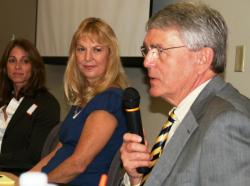 All teachers will encounter students with international backgrounds, and teachers who speak a second language are most prepared for this, said Maria Coady, assistant professor in ESOL/bilingual education.
All teachers will encounter students with international backgrounds, and teachers who speak a second language are most prepared for this, said Maria Coady, assistant professor in ESOL/bilingual education.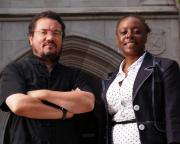 Two University of Florida counselor education faculty members have been recognized for their work in advancing the globalization of the University of Florida campus and curriculum through teaching, research and service.
Two University of Florida counselor education faculty members have been recognized for their work in advancing the globalization of the University of Florida campus and curriculum through teaching, research and service.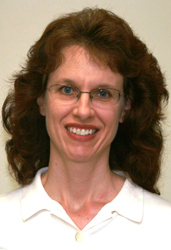 Cathy Cavanaugh, associate professor in education technology at UF’s College of Education, has received international recognition for advancing innovative online learning in public primary schools.
Cathy Cavanaugh, associate professor in education technology at UF’s College of Education, has received international recognition for advancing innovative online learning in public primary schools. This March, the 2010 Census will arrive in every Gainesville resident’s mailbox. The responses will directly affect the distribution of more than $400 billion in federal funding for education, healthcare, transportation and the environment. Off-campus students must fill out the form with their housemates and return it by mail before April 1. It is important that everyone in Gainesville fill out the census form to ensure funding that will help keep The Gator Nation–and the EduGator Nation–great. For more information, visit
This March, the 2010 Census will arrive in every Gainesville resident’s mailbox. The responses will directly affect the distribution of more than $400 billion in federal funding for education, healthcare, transportation and the environment. Off-campus students must fill out the form with their housemates and return it by mail before April 1. It is important that everyone in Gainesville fill out the census form to ensure funding that will help keep The Gator Nation–and the EduGator Nation–great. For more information, visit 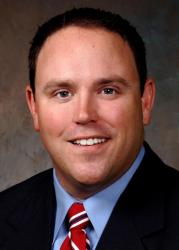 Hodge appointed senior director of development-alumni affairs
Hodge appointed senior director of development-alumni affairs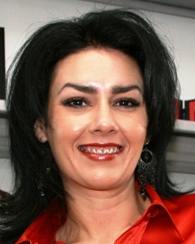 Dixon, A. L., & Hansen, N. (2010). Fortid, nutid, fremtid (past, present, future): Professional counseling in Denmark. Journal of Counseling & Development, 88, 38-42.
Dixon, A. L., & Hansen, N. (2010). Fortid, nutid, fremtid (past, present, future): Professional counseling in Denmark. Journal of Counseling & Development, 88, 38-42.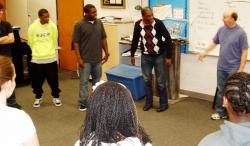 LA radio-theater group works with PKY student performers
LA radio-theater group works with PKY student performers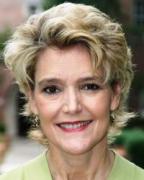 Suzanne Colvin
Suzanne Colvin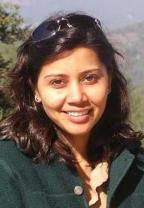 Swapna Kumar
Swapna Kumar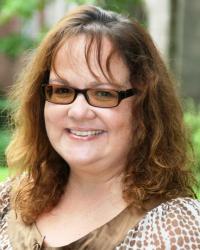
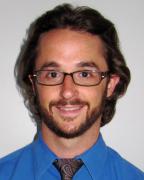 Philip Poekert
Philip Poekert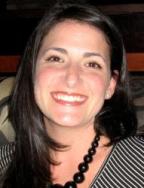 Jacqueline Zeig
Jacqueline Zeig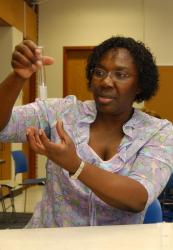
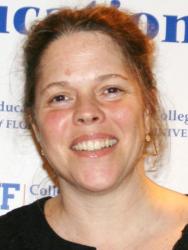 Darby Delane, School of Teaching and Learning
Darby Delane, School of Teaching and Learning


